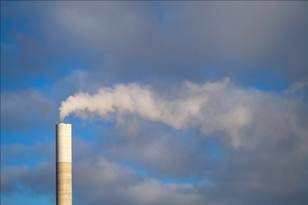

News
Three UK banks named in top twenty ‘climate killers’ rating
Barclays, the Royal Bank of Scotland and HSBC are financially supporting the coal industry, despite on the face of it, being committed to green and environmental issues, a study finds. Alex Blackburne has the details.
At a time when the world should be uniting to move away from the use of fossil fuels, a new study has found that financial institutions across the globe have lent billions of euros to the coal sector, making the international fight against climate change that bit more difficult.
Barclays, the Royal Bank of Scotland and HSBC are financially supporting the coal industry, despite on the face of it, being committed to green and environmental issues, a study finds. Alex Blackburne has the details.
At a time when the world should be uniting to move away from the use of fossil fuels, a new study has found that financial institutions across the globe have lent billions of euros to the coal sector, making the international fight against climate change that bit more difficult.
The study, conducted by NGOs urgewald and BankTrack, along with South African organisations groundwork and Earthlife Africa Jhb, assessed the financial dealings of 93 banks from all over the world, to determine how much support each had given to the industry.
It found that JP Morgan Chase, Citi and the Bank of America – all from the United States – were the top three contributors, having invested over €42 billion into the sector between them since 2005.
Barclays were the highest UK bank on the list in fifth, after it lent €11.5 billion, whilst the Royal Bank of Scotland (€11 billion) was ranked seventh and HSBC (€4.5 billion) 20th.
Heffa Schücking of urgewald said, “We have examined the financing of coal because coal power plants are the largest source of CO2 emissions.
“Our investigation alarmingly shows that coal funding has doubled since the implementation of the Kyoto Protocol, almost despite the increasingly evident catastrophic consequences of climate change.”
The controversy behind the findings is down to the nature of energy extraction from coal. It is common knowledge that it is one of the major global polluters, producing billions of tonnes of carbon emissions worldwide and air pollution. The fact that some of the world’s richest banks are backing it is contradictory to their supposed ethics.
For example, the report quotes each of the top 20 on their so-called ‘climate commitments‘.
Barclays’ reads, “Managing the climate change risks of our operations and those of our clients”, and RBS’ reads, “As a financial services group our direct impact on the environment in terms of climate change […] is limited”. Meanwhile, arguably the most laughable of the lot given what we know now, “HSBC adopts a cautious approach to activities which contribute significantly to climate change“.
The contrasting practice and theory within the three UK representatives is shocking, and begs the question whether we can trust anything they say at all. Blue & Green Tomorrow reported just this week that RBS had pulled their sponsorship of Climate Week, with the phrase ‘corporate greenwash‘ being a buzz word following the announcement.
The report highlights the growing need for worldwide capital to be invested in ethical and sustainable companies.
The ethical investment sector is one of the fastest-growing in the world, and earning the support of some of the world’s most high-profile financial organisations would be hugely beneficial for not only the field itself, but the future of the planet.
The top 20 climate killer banks
1. JP Morgan Chase (United States)
2. Citi (United States)
3. Bank of America (United States)
4. Morgan Stanley (United States)
5. Barclays (UK)
6. Deutsche Bank (Germany)
7. Royal Bank of Scotland (UK)
8. BNP Paribas (France)
9. Credit Suisse (Switzerland)
10. UBS (Switzerland)
11. Goldman Sachs (United States)
12. Bank of China (China)
13. Industrial and Commercial Bank of China (China)
14. Credit Agricole / Calyon (France)
15. UniCredit / HVB (Italy / Germany)
16. China Construction Bank (China)
17. Mitsubishi UFJ Financial Group (Japan)
18. Societe Generale (France)
19. Wells Fargo (United States)
20. HSBC (UK)
If you would like to know more about investing ethically, or would like to transfer your existing savings to a bank that doesn’t have such a potentially catastrophic effect on the environment, then ask your financial adviser, if you have one, or complete our online form and we’ll connect you with a specialist ethical adviser.


 Environment12 months ago
Environment12 months agoAre Polymer Banknotes: an Eco-Friendly Trend or a Groundswell?

 Features11 months ago
Features11 months agoEco-Friendly Cryptocurrencies: Sustainable Investment Choices

 Features12 months ago
Features12 months agoEco-Friendly Crypto Traders Must Find the Right Exchange

 Energy11 months ago
Energy11 months agoThe Growing Role of Solar Panels in Ireland’s Energy Future
















